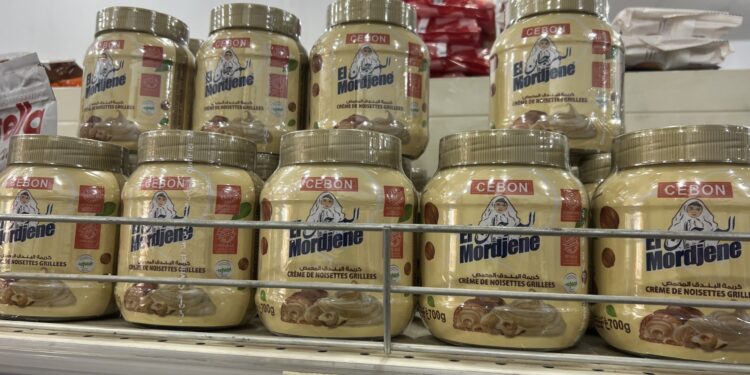Aljazeera.net correspondents
AlgeriaIt seems that the great success achieved by “Marjan Chocolate” in the recent period did not intercede for it with the French authorities, who are still trying to find out the reasons for the continued presence of this product in the French market despite the decision to ban it, which is still causing controversy in France and Algeria.
Last week, the French authorities prevented the unloading of containers at the port of Marseille (southern France) that were carrying shipments of Algerian chocolate products, claiming that they violated European standards, based on Article 20, paragraph 3, of European Union Regulation No. 2020/2292.
The Algerian company, Marjan, was preparing to reap the fruits of the success it achieved in meeting the needs of its customers in France, Europe and various countries of the world, which prompted it to expand its activity and open the door to employment to meet the great demand.
The company had never exported large quantities of its product despite its popularity, due to the lack of official distributors outside Algeria, before confirming its contact with distributors to meet the high demand for the product, as revealed by its official spokesperson, Amin Ozlifi, in statements to a local media outlet.
Coral.. The truth about the European ban
The national coordinator of the Algerian Organization for Consumer Protection and Guidance, Fadi Tamim, confirmed that the reasons given by France to prevent the entry of coral products into the European Union countries, despite their presence in its markets for some time, on the pretext that they are not monitored and are not safe, in conjunction with their wide fame, are incorrect reasons.
In his interview with Al Jazeera Net, Tamim revealed that after the Algerian Organization for Consumer Protection and Guidance reviewed documents containing the reasons for this decision, it became clear that it was related to economic interests and the interests of other companies, nothing more.
He returned to the ban decision itself, stressing that it relates to milk and its derivatives, while Marjan chocolate is a spreadable cream that includes a type of milk as one of its ingredients.
He wondered about the reasons for banning the Marjan product under the pretext that the milk does not meet the standards, even though it was originally imported from Europe and according to European standards, stressing that the organization obtained a certificate showing that a quantity of milk estimated at 100 tons was recently imported from France, which makes the matter deliberate, as the Algerian Marjan product and its popularity have become a threat to the interests of other companies.
Food Industries in Numbers
- The food industries in Algeria witnessed a tangible recovery at the beginning of 2021, recording a growth rate of more than 15% in demand, while production growth did not exceed 0.9% in 2020, according to figures from the Algerian Statistics Office.
- Currently, there are more than 47,200 companies operating in Algeria, representing the fabric of the food industry, with a value estimated at 12 billion dollars, excluding beverages, and 2 billion dollars for non-alcoholic beverages, bringing this total figure to 14 billion dollars.
- The number of workers in food industry establishments at the beginning of last year 2023 reached approximately 170,000 workers, which allowed raising their contribution to the industrial gross domestic product to about 50%, according to statements by the former Algerian Minister of Industry.
- Algeria’s food exports reached nearly $400 million last year, 2023, according to statements made by the central director of the Directorate for Monitoring and Promotion of Trade Exchanges at the Algerian Ministry of Trade to Algerian Radio in July 2024.
- Algeria’s annual exports of beverages and liquid foods alone are worth $20 million.
Most important markets
Regarding the products that occupy the top spot on the list of exported products, the head of the Algerian Exporters Association, Tariq Boulmerka, explained that they are:
- Sugar
- Dates
- olive oil
- Carob
- Biscuits
- Drinks
The most prominent countries to which these goods are exported are:
- Tunisia
- France
- Belgium
- Spain
- Along with about 25 to 30 European countries in all industries.
In his interview with Al Jazeera Net, the head of the Algerian Exporters Association referred to the presence of a number of dealers currently in countries, most notably Qatar, Saudi Arabia and Russia, to establish new partnerships, in addition to targeting African markets.
Boulmerka revealed new facilities that enable Algerian economic operators to open points of sale to promote their products in the country of their choice, which is currently being worked on by issuing permits to exporters in accordance with what is stipulated in a new agreement concluded in this regard.
Food industries and self-sufficiency
The head of the Algerian Exporters Association confirmed that Algerian markets now have most of the locally manufactured products of all kinds, especially with the adoption of the new investment law, which now encourages the launch of domestic investment projects.
For his part, Professor Faris Habash, Professor of Economics at Setif University, said that Algeria has adopted in recent years a different strategic plan to manage the Algerian economy, as the focus has been on diversifying sources of income and encouraging and developing Algerian production to enable it to achieve self-sufficiency to ensure food security.
Speaking to Al Jazeera Net, Habash stressed that Algeria has worked to develop the agricultural sector as it is the main pillar of the food and processing industries.
The economics professor considered that Algeria was able to achieve self-sufficiency in food needs, depending on national production at a rate estimated at 75%, which places it in first place in Africa and the Arab world.



